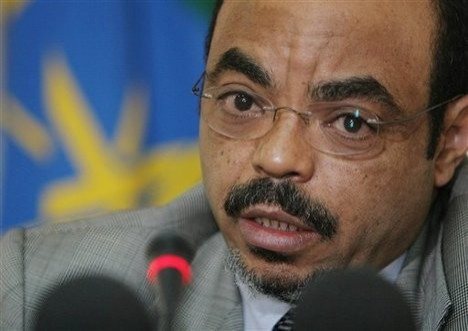Ethiopia PM May Pardon Politicians, Journalists, If Jailed 'Admit Guilt'

Ethiopian Prime Minister Meles Zenawi announced Wednesday that he may pardon journalists, politicians and dissidents detained under an 2009 anti-terrorism law, while still denying that the arrests were politically motivated.
Rights groups have reported that more than 150 people, including 10 journalists, have been imprisoned under the Anti-Terrorism Proclamation since 2009. Human Rights Watch called the law restrictive in January 2012 report, and said it has been used to justify arrests of both journalists and members of the political opposition.
Zenawi denied the allegations, according to Reuters, which quoted him as telling Parliament: All trials are transparent. All suspects are allowed access to lawyers and some have even been freed when no evidence was found to justify their arrests.
But we would also consider granting clemency if culprits admit guilt and to making mistakes, he added.
Mohamed Keita, Africa Advocacy Coordinator at the Committee to Protest Journalists, views this statement with skepticism.
This is exactly what the government wants, Keita said. It is a conditional pardon, and they can revoke it at any time.
For Ethiopian nationals, this conditional clemency would effectively constitute suspension of free speech and political activities. Since 2001, at least 79 Ethiopian journalists have fled the country, more than any other country in the world, according to CPJ.
Designated Terrorists
Under the Anti-Terror Proclamation, two armed groups -- the Ogaden National Liberation Front and the Oromo Liberation Front -- and one opposition party, Ginbot 7, have been labeled terrorist organizations.
HRW reported that in March 2011, authorities arrested more than 200 members and supporters of two registered opposition parties --the Oromo Federal Democratic Movement and the Oromo People's Congress -- publicly accusing them of involvement with the OLF.
Those arbitrarily arrested and detained included former members of Parliament, long-serving party officials, and candidates in the 2010 regional and parliamentary elections, reported HRW.
Among the 10 journalists in custody are two Swedish nationals, reporter Martin Schibbye and photographer Johan Persson, who were given 11-year sentences, charged with aiding the ONLF and entering the country illegally. Schibbye and Persson admitted to illegally entering into Ethiopia's Ogaden province through Somalia, but said it was to investigate the activities of an oil company that purchased licenses there in 2009 from Sweden's Lundin Petroleum.
The harsh sentences against Johan Persson and Martin Schibbye are an affront to justice and press freedom, said Keita in a CPJ statement. With this politicized case, authorities showed they are intent on quashing coverage of important events in the Ogaden region. The Ethiopian government should unconditionally release Persson and Schibbye, and allow independent access to the Ogaden region.
Despite the mounting international criticism over Zenawi's application of the anti-terror law, many foreign governments have yet to speak out, including the U.S., which declares Ethiopia an important regional security partner of the United States on the State Department's Web site.
From the U.S. point of view, said Keita. The security issue trumps the human rights issue.
© Copyright IBTimes 2024. All rights reserved.





















